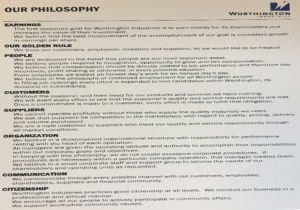Expert HR Insight: What Makes a Phenomenal Culture?
It’s a straightforward question with a complex answer: What makes a corporate culture phenomenal?
Vice President of Human Resources at Worthington Industries Terry Dyer pauses for a moment to think before answering confidently, “It’s in the way people treat you.”
Dyer is a big proponent of the importance of culture at Worthington. He says he is fortunate to work for a company with such a strong focus on culture where mutual respect between colleagues and teams is not just the goal, but the expectation.

“I believe a phenomenal culture is defined by the way people work together to accomplish a common goal. From the top of our organization down, we believe our employees are our most important asset. I think a lot of organizations lose sight of that fact. At the foundation of our culture at Worthington is set of guiding principles we call “Our Philosophy”.
Dyer goes on to explain that the company’s founder, John H. McConnell, put the wheels of this in motion in 1966 by writing down the things he felt were the most important in how the company should operate. This core set of operating principles was based on the “Golden Rule”; we treat our customers, employees, investors, and suppliers, as we would like to be treated. Fast-forward to today, these are still the same core values that all of our employees live by. It’s Our Philosophy that helps guide our company growth, defines our culture, and serves as a touchstone for all aspects of business. “I’ve never worked for a company that actually lives, eats, and breathes these principles.”
“These guiding principles are so important to our founder and his son, current CEO, John P. McConnell, that he actually takes our top 50 leaders offsite every so often to go through every line of the
guiding principles in Our Philosophy and ask the question ‘Are the principles as relevant to how we want do business today as it was when it was first put on paper?’ Up to this point, we’ve not made any changes.”
Other subjects addressed on the philosophy cards include people, customers, suppliers, what the organization should look like and how it should function, communication, and the importance of citizenship and being a part of the community.
“A lot of companies have something like these cards, but I’ve never been around a group or leadership team that truly embraces what is said and integrates it into every aspect of business, which I think is super cool. This has helped us form the phenomenal culture that we have today,” Dyer says.
Dyer’s closing remarks about the importance of culture to a successful business: “Culture is kind of like the air. You can’t see it, but man, if it’s not in the room, you’ll sure know it.”
There’s a lot we can learn from Dyer as an HR leader and Worthington as a company. Corporate culture is important, but it doesn’t just happen. It takes intentional, ongoing effort from everyone, starting with leadership who serve as the role models for all.









